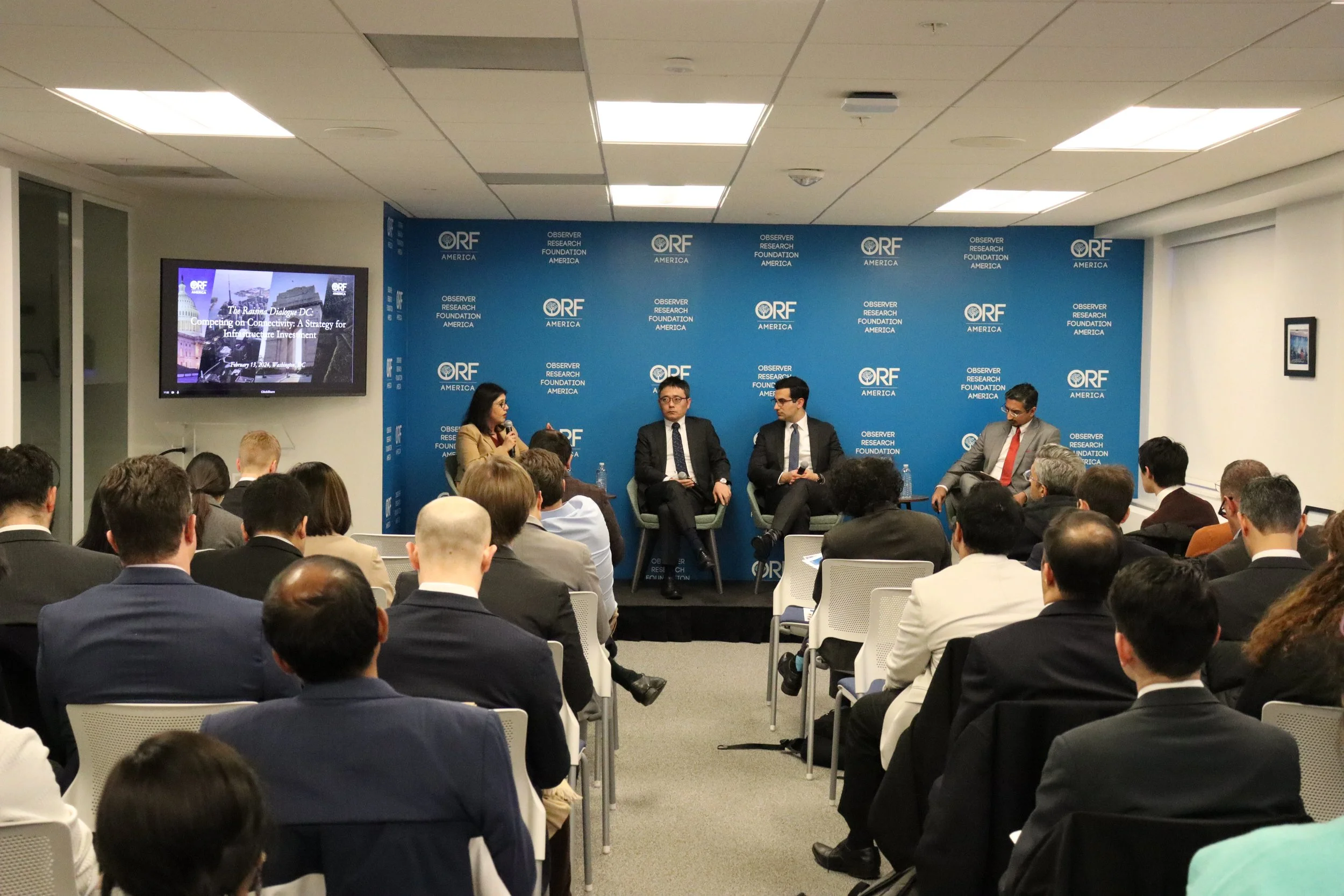The Raisina Dialogue DC
Washington | April 26th, 2022





















I. Welcome Remarks
Sharon Stirling, Chief Operating Officer, ORF America
Dhruva Jaishankar Executive Director, ORF America (Read here)
II. The United States in the Indo-Pacific
Michèle Flournoy, Co-Founder and Managing Partner, WestExec Advisors & former U.S. Under Secretary of Defense for Policy
Michael Fullilove, Executive Director, The Lowy Institute, Australia
Bill Hagerty, U.S. Senator (R-Tenn.) and former U.S. Ambassador to Japan
Mira Rapp-Hooper, Director, Indo-Pacific, U.S. National Security Council
Dhruva Jaishankar, Executive Director, ORF America (moderator)
The panel covered a wide swath of issues animating contemporary U.S. policy in the Indo-Pacific region; the China challenge, Aukus, regional partnerships with ASEAN, India and Taiwan and the White House Indo-Pacific Strategy and the Indo-Pacific Economic Framework. Senator Hagerty emphasized the importance of India and Japan and called for the U.S. to strengthen its economic and energy presence in the Indo-Pacific. Michele Flournoy stressed on the vital U.S. interests at stake namely China’s challenge to the regional rules-based order and foreshadowed that Taiwan could be a future flashpoint in U.S.-China relations. Mira Rapp-Hooper reiterated that U.S. prosperity and security is tied to the Indo-Pacific and highlighted the ongoing inter-agency coordination in implementing and resourcing the Indo-Pacific strategy. Michael Fullilove signaled Australia’s receptiveness with the U.S. government’s “allies first” approach and underlined the bipartisan nature of Australia’s concerns with China. Overall, there was strong convergence on the U.S. to buttress its regional partnerships and alliances to enhance deterrence as well as pool resources to address shared challenges. Also, speakers suggested the need to widen the conceptual appeal of the Indo-Pacific within the U.S. and boost people-to-people ties in the region.
III. Energy Security & Access: US Cooperation with the Developing World
Katie Auth, Policy Director, Energy for Growth Hub
Andrew Light, Assistant Secretary for International Affairs, U.S. Department of Energy
Varun Sivaram, Senior Advisor to the U.S. Special Presidential Envoy for Climate
Shayak Sengupta, Fellow, Energy and Climate, ORF America (moderator)
The panel covered critical questions around energy poverty, energy transitions, and energy security, focusing on developing countries. Rising energy prices resulting from the conflict in Ukraine, declining access to energy resulting from the pandemic, and climate change are all posing substantial and unique challenges for countries around the world. Speakers noted that energy discourse tends to be dominated by the EU and the United States, but this masks the unique and differentiated challenges faced by developing countries. The speakers highlighted that most developing countries are creating energy solutions of their own that must be harnessed and supported. This requires the mobilization of capital, especially public finance. It also requires the forging of mutually beneficial partnerships to catalyze existing technologies and lead to innovation.
IV. Securing Cyberspace and Critical Infrastructure
Betsie Chacko, Associate Director, Cybersecurity & Infrastructure Security Agency (CISA)
Chris DeRusha, Federal Chief Information Security Officer, U.S. Office of Management and Budget (OMB)
Elina Noor, Director, Political-Security Affairs, The Asia Society Policy Institute
Bruce McConnell, Distinguished Fellow, ORF America (moderator)
Participants discussed the multifaceted challenges to coordination and cooperation in tackling cyberspace threats, both within the U.S. government, as well as internationally. Chris DeRusha argued that taking advantage of the different approaches that governments take to solve the common challenges of cyberspace is necessary. Betsie Chacko suggested that improved information sharing with partners is a critical part of collective defense because cyberspace issues do not respect national borders. Elina Noor stressed the importance of broadening the lens on cyberspace challenges, and the need to think beyond the major cyber powers and involve the perspectives of smaller countries. All three speakers were clear that more international efforts were necessary to secure cyberspace and that cooperation needed to go beyond buzzwords and become more tangible.













